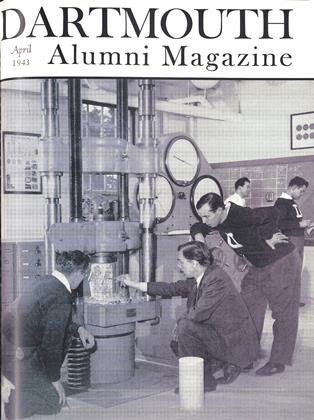Between the classical and the modern side in the field of education there has long been a state of war, with the odds to date somewhat in favor of the moderns. Here and there one may detect the beginnings of a shift, however, which is natural considering the propensity of the American public to swing from one extreme to another. It has taken the war, with its inevitable emphasis on technical training, to bring out a stronger defense of the non-technical aspects of higher education, mainly through fear that zeal for the scientific, as opposed to the cultural, may get out of hand.
Rather curiously there has seemed to be even more said in favor of the classics by those who have prided themselves at times on having small Latin and less Greek, than is being said by convinced classicists, perhaps because alarm has been aroused lest what we generally call "liberal" education go by the board, under the stress of arms. Some of the stoutest defenders have been among those with a confessed preference for the "practical" courses, presumably because of their devotion to Aristotle's golden mean and their recognition of the fact that a just balance needs to be maintained between those studies which directly enable a man to earn a living and those which enable him best to enjoy that living when it has been earned. After all, education cannot truthfully be called "liberal" unless it be reasonably well rounded. Besides there is a growing consciousness that some of the practical courses are not so practical as they seem—or that so-called non-practical studies are more surely practical than most of us had realized.
It is not likely that many would wish to see college education revert to what it was a century ago, or less, with the ancient classics playing the major roles; but it is at least clear that there is a growing resentment of the idea that such things lag superfluous on the stage and should be elbowed into the wings and forgotten. We got fully as good leadership from our statesmen in the days when they were nurtured on Homer, Virgil, Horace, Plato and the rest, as we get in these days when most of the worship is paid at the altars of Science. Possibly we shall come to understand that liberal education implies a variety of vitamines that are requisite and necessary as well for the body as the soul. What we should be seeking is to broaden, not to narrow, the mind.
 View Full Issue
View Full Issue
More From This Issue
-
 Article
ArticleDaniel Webster and Dartmouth
April 1943 By CARROLL A. WILSON -
 Lettter from the Editor
Lettter from the Editor'Round the Girdled Earth
April 1943 -
 Article
ArticleDartmouth War Directory
April 1943 -
 Class Notes
Class Notes1918
April 1943 By ERNEST H. EARLEY, RICHARD A. HOLTON -
 Class Notes
Class Notes1939
April 1943 By ROBERT DICKGIESSER, J. MOREAU BROWN -
 Class Notes
Class Notes1931
April 1943 By CHARLES S. MCALLISTER, CHARLES A. GRISTEDE
P. S. M.
-
 Article
ArticleGRADUS AD PARNASSUM
June 1943 By P. S. M. -
 Article
ArticleThe Astounding Record
October 1943 By P. S. M. -
 Article
ArticleWorth Doing Well
November 1943 By P. S. M. -
 Article
ArticleLet Them Eat Spinach?
August 1945 By P. S. M. -
 Article
ArticleThe Pity of It
February 1946 By P. S. M. -
 Article
ArticleMusic and Drama
April 1946 By P. S. M.








